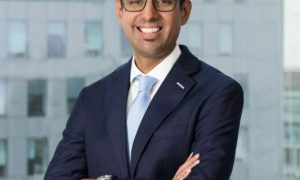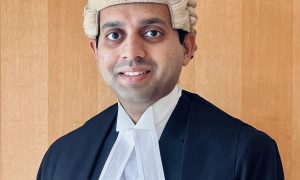This interview has been published by Namrata Singh and The SuperLawyer Team

You have worked in different places including Hong Kong, Singapore, Tokyo and Belfast. Could you share some insights into the challenges or struggles you faced along the way, and how these experiences have contributed to your personal and professional growth?
Every jurisdiction has its unique challenges and a different regulatory landscape. There are also differences in market practices and work culture. However, exposure to such differences helps you become a better lawyer and allows you to think outside the box and bring a global perspective to help your clients. On the personal front, I don’t see it as a journey filled with struggles; on the contrary, it has been quite exciting and fun. Yes, you do miss your family, friends, and the familiarity of the place you are from, but I have been lucky to find excellent friends, colleagues, and mentors along the way. I love experiencing new places and cultures, so I have tried to make the most of it.
You’re managing a team delivering outsourcing and transaction management solutions in your current role at Herbert Smith Freehills, ALT Finance. What unique challenges and rewards come with overseeing a team working on such diverse projects?
I enjoy the different hats I need to wear. In addition to core legal skills, my role involves team, project, and stakeholder management. Every day is different; you need to continuously innovate and provide tailored solutions to clients at a large scale. I have been lucky to work with clients who are industry leaders, and I find solving problems for them very rewarding. I am also very passionate about people management, learning and growing together as a team, and celebrating each other’s success, which brings me a lot of happiness.
Having worked with major financial institutions like HSBC and JP Morgan Chase & Co., what are some of the key insights you’ve gained about the intersection of law and finance in the derivatives space?
Derivatives is a complex and highly regulated practice area. To be a good derivatives lawyer, you need to understand different derivatives products and the economic outcomes that they are trying to achieve. You can’t afford to look at things only through the lens of laws and regulations and need to be aware of operational, credit, and reputational risks and limitations. My in-house stints at large investment banks were extremely helpful in improving my knowledge of different derivatives products as well as operational and other commercial aspects of the industry.
You’ve managed large teams of lawyers and paralegals. What strategies do you employ to foster a collaborative and efficient working environment within your teams?
There is no straitjacket formula – every individual is different. Appreciating these differences and creating a positive work environment based on trust and mutual respect is very important. Having fun as a team and celebrating little wins and each other’s success is also essential. To develop a high-performing team, a manager must empower and help teammates grow by giving them the support and space they need.
You worked in different capacities including as an Associate Counsel as well as a Manging Consultant. What adjustments or learnings did you find most valuable when you shifted to a leadership role?
It is an evolutionary process; there are always opportunities to lead the way, even when you are not formally in a leadership / managerial role. Effective delegation and leading by example are crucial. It is about striking a balance between acknowledging that you can’t do everything on your own and knowing that there are certain things that you must learn to do well yourself before delegating to others.
As a derivatives lawyer with a keen interest in legal technology, what advancements in legal tech do you find most promising for the future of transactional law?
No prizes for guessing – AI is the obvious one. However, it is essential to differentiate between tech solutions that add genuine value and solve complex problems from solutions that are more bells and whistles. AI has radically changed how large-scale projects are managed and delivered in the last few years.
The industry will generally see an increase in the adoption of tech platforms for streamlining document negotiations.
I am looking forward to seeing the next leap in generative AI solutions. Currently, the technology is prompt engineering dependent, and there are concerns about accuracy and reliability. These issues will be ironed out pretty soon, and the technology’s ability to learn from and understand us will increase manifold.
You’ve held diverse roles in different geographical locations. How have you navigated the cultural nuances in these regions, and do you believe that understanding cultural differences is essential for success in the legal profession, especially in the derivatives and finance sectors?
Absolutely – at the end of the day, we are in a people-centric profession. Keeping an open mind as well as appreciating and respecting differences go a long way. I have come to realize that the world is smaller than we think it is and navigating cultural nuances or differences is not difficult as long as you keep an open mind. It is also important to appreciate cultural similarities instead of focusing on just the differences!
Having worked across various international offices, is there a particular country that holds a special place in your heart, both professionally and personally? How has your experience in that country influenced your approach to law and life?
Tough question. It would be impossible to single out any place. As mentioned, I have been lucky to find excellent friends, colleagues, and mentors wherever I have worked. The person I am is a culmination of my different experiences. I have learned a lot from and felt welcome everywhere.
With your passion for quizzing, how do you balance your high-stakes legal career with your interests outside of work? Any favorite trivia or quiz moment you’d like to share?
It is really important to have a passion or a hobby outside of work – especially for one’s mental health. Your work can get quite taxing and stressful, so it is nice to have something to look forward to outside of work. Quizzing was quite a sidelined activity when I was in law school. I and a few friends started the Quiz Club at our university (RMLNLU, Lucknow). Work does get in the way of quizzing, and I don’t get to participate or conduct as many quizzes as I would like, but I try to whenever possible.
During the pandemic, when there were no live quizzes for obvious reasons so I started a quiz podcast with a friend. We made ten episodes on diverse topics. We were pretty surprised with how well it did on platforms like Spotify and Apple Podcasts, and we had a lot of fun in the process, and it kept us going when we were trying to cope with the lockdown.
You’ve had international stints in various countries. How do you perceive the differences in legal education between India and abroad, and what insights can you share for someone considering pursuing an LLM in India or abroad?
I might not be the best person to answer this because I did not study law abroad. Back in law school, there were not enough courses if one wanted to be a transactional lawyer, and interaction with experts from the industry was limited. Now, that has changed significantly. Law schools do get experts from the industry frequently and offer specialised seminar courses. Private players like LawSikho have done a great job in making practical legal education accessible.
Based on my interaction with my colleagues and law students abroad, I think firms are more proactive in reaching out and connecting with students. The process for vacation schemes and training contracts is much more efficient, accessible, and consistent across firms.
In India, the industry can do much more to make itself accessible to law students.
Given your successful career trajectory, what advice would you offer to the current generation aspiring to excel in the field of law, especially those interested in derivatives and legal technology?
I am not very good at giving advice. My career path has not been very traditional. It is crucial to find out what genuinely interests you. If you are not lucky enough to do what you love, see if you can love what you do. Don’t succumb to peer pressure and take up something because everyone else is doing it.
For someone who wants to pursue a career as a derivatives lawyer, a good understanding of the financial ecosystem and macroeconomics can definitely help.
The legal tech landscape is evolving rapidly and has a lot of exciting career opportunities. I think developing an acumen for technology to understand how it works is important. The best way of doing it is learning how to code. You can start by playing around with low code / no code platforms and move on to learning coding. There are excellent resources all over the internet.
It is also vital to learn how to network effectively. Don’t be shy in reaching out to people and introducing yourself!
Get in touch with Aritra Chatterjee-
























